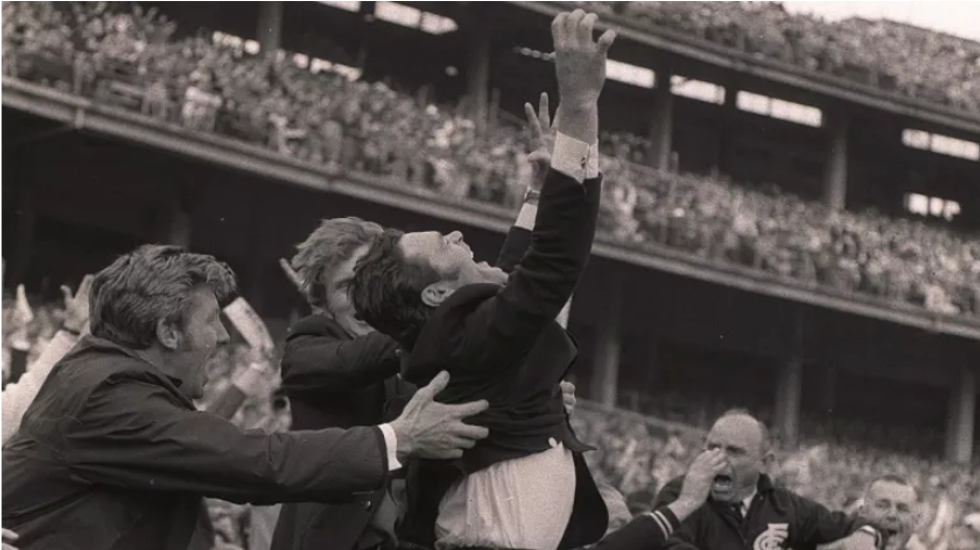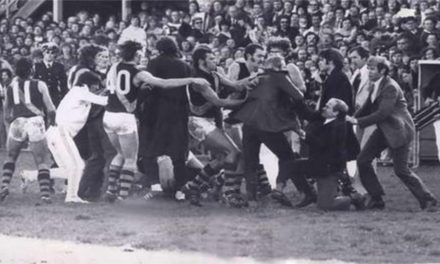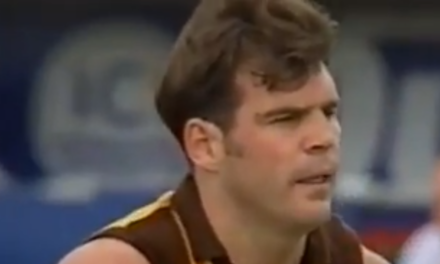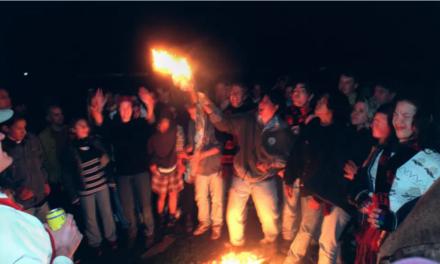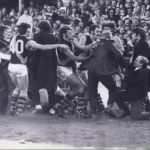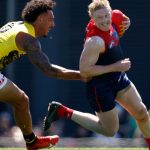Carlton coach Ron Barassi throws his arms to the heavens as the siren heralds the greatest grand final comeback of all time. Photo: FAIRFAX SYNDICATION
Rounds Of Our Lives: The greatest grand finals of them all
With grand final week finally upon us, what better than reminiscing on some of the greatest premiership deciders from years gone by to get in the mood before the last Saturday in September?
Some of the game’s most famous moments have occurred during grand finals, from Alex Jesaulenko’s iconic mark in 1970, to Dermott Brereton being shirtfronted by Mark Yeates at the opening bounce in 1989.
Because, like a match-winning Nick Malceski snap, or Saints’ skipper Darrel Baldock holding the premiership cup aloft wearing a Collingwood jumper, so are the Rounds of our Lives.
CARLTON 17.9 (111) d COLLINGWOOD 14.17 (101) (MCG, grand final 1970)
In arguably the greatest grand final of them all, Carlton overcame a 44-point half time deficit to defeat Collingwood in front of a record 121,696 fans at the MCG.
Collingwood entered the match as warm favourite, with the minor premier having defeated the Blues three times already that year – including by 10 points only two weeks earlier in the second semi-final.
The Pies started the game well, though inaccuracy saw them only manage four goals from 12 scoring shots in the first term to lead by 29 points at the first break.
Peter McKenna was on fire for Collingwood, kicking five first-half goals, but things soon began to turn against the Pies.
First, McKenna was left dazed after being knocked in a marking contest that bruised teammate Des Tuddenham’s hip. Than another dominant Pie, Wayne Richardson, was impeded by a calf strain.
Late in the quarter, Alex Jesaulenko took to the skies, launching on to Collingwood’s Graeme “Jerker” Jenkin’s shoulder to take arguably the most famous mark in league history.
Still, Carlton headed into half-time staring at a 44-point deficit, with few expecting anything other than a Collingwood victory.
Blues’ coach Ron Barassi was furious when he entered the rooms during the main break, reportedly knocking over a wooden table with drinks and slamming the players for their lack of handball in the first half.
While it is unclear whether Barassi actually urged his players to handball at all costs – a directive which has been credited with birthing the modern game – the Blues clearly took a quicker, running approach to the second half, continually playing on after marking.
Also at half-time, Barassi made the decision to replace Bert Thornley with small forward Ted Hopkins, which proved a masterstroke, Hopkins kicking four second-half goals.
Carlton proceeded to stun Collingwood in the third quarter, kicking seven goals to one behind in an amazing burst which took just 13 minutes, before the Pies kicked two late goals to end the term.
Holding a 17-point three quarter-time lead, many still expected Collingwood to hold on, even more so after Len Thompson kicked the first goal of the final term to restore the Pies’ lead to 21 points.
But Carlton continued to charge. Carlton captain and ruckman John Nicholls, now parked near the goal square, received a free kick and converted. Minutes later, he plucked a mark over the top of the pack and booted another, the difference now just eight points 11 minutes into the quarter.
At the 21-minute mark, Carlton’s Syd Jackson smothered a kick from the Pies’ Peter Eakins, raced on the ball and dished off a handball to Hopkins, who kicked his fourth, the margin now a solitary point.
And when Brent Crosswell received a free kick for a high tackle 30 metres out and goalled, Carlton finally took the lead into time-on.
The sealer, and final dagger through Collingwood’s heart, came after McKenna had nearly marked for the Pies. A Serge Silvagni clearing kick bounced past the centre, where Jesaulenko swooped on to the ball and between two despairing defenders. He threw the ball on to his left boot, the kick bouncing on and on and over the goal line as the record crowd went wild.
The win delivered Carlton its 10th premiership, while Collingwood’s inability to seal victory once again in a grand final saw the birthed of the famous “Colliwobbles” tag, which became even more enshrined over the next 11 years as the Pies made another five unsuccessful grand final appearances (including a replay in 1977).
Overall, the game will forever be remembered for its record half-time comeback, the Jesaulenko mark, and the mammoth crowd of 121,696, an all-time attendance record for any football code in Australia that is unlikely to ever be broken.
HAWTHORN 21.18 (144) d GEELONG 21.12 (138) (MCG, grand final 1989)
In a classic contest pitting the seasoned pros against the precocious up-and-comers, the Hawks held off a late charge from Geelong to win the 1989 grand final.
Hawthorn was accustomed to big stage, playing its seventh successive grand final, while Geelong was a youthful side on the rise featuring in the club’s first grand final since 1967.
The game certainly started with a bang, Hawk star Dermott Brereton left with a lacerated kidney after being shirtfronted by Geelong’s Mark Yeates at the first bounce.
The Hawks didn’t let this faze them though, as they slammed on eight first-quarter goals to lead by 40 points at the first break.
While the next two quarters were fairly even, Geelong launched a mighty comeback in the final term, with Hawthorn having had a steady stream of players hurt in one of the toughest grand finals seen.
Down by 36 points, Geelong began to run over the top of the Hawks, who were battered and left with no fit players on the bench.
Gary Ablett senior – who finished with a Norm Smith Medal-winning nine goals – tried desperately to drag his side over the line. But an eight-goal final quarter wasn’t enough to overcome the might of Hawthorn, which held on by six points.
Despite the result, the match will always be remembered for being as tough as it was high-scoring, with 42 goals kicked making it the second highest aggregate in grand final history.
SYDNEY 14.7 (91) d HAWTHORN 11.15 (81) (MCG, grand final 2012)
In a classic see-sawing contest featuring two sides which refused to wilt, Sydney snatched the premiership cup in 2012 with a famous snap from Nick Malceski.
Hawthorn was favourite going into the game, and started strongly, kicking four goals to one to set up a 19-point lead at quarter time.
Blustery conditions made kicking for goal difficult for both teams, but Sydney was able to turn the tide in the second term, kicking three goals in the first seven minutes to even things up.
By midway through the third term, Lewis Roberts-Thomson had kicked the Swans’ eighth unanswered goal to stretch their lead to 28 points.
Hawthorn, though, was by no means finished, proceeding to kick five goals in just 10 minutes, including a spectacular 65-metre running bomb from Lance Franklin.
Sydney held a one-point lead at the final change, but it soon evaporated as Luke Breust and David Hale goaled early in the last quarter.
But now it was Sydney’s turn to impose itself, and the Swans did through goals to Dan Hannebery, Kieren Jack and a bouncing effort from an injured Adam Goodes, hobbled by a knee injury.
With Sydney holding a four-point lead in the final minute of the game, it was Malceski who sealed a famous victory with a stunning snap that floated post-high through the goals as the MCG stands erupted.
ST KILDA 10.14 (74) d COLLINGWOOD 10.13 (73) (MCG, grand final 1966)
St Kilda may have won only one premiership, but the Saints’ one-point 1966 triumph over Collingwood is perhaps the most famous grand final win of all time.
Despite the Saints’ historical lack of success, the club was in a strong position in the mid-1960s. They won the minor premiership in 1965 and made that year’s grand final, but lost by 35 points to Essendon.
In 1966, St Kilda finished second on the ladder and set up a grand final clash with the top-of-the-table Magpies, who had defeated them by 10 points in the second semi-final.
The grand final was tight all day, with the fourth quarter particularly tense.
St Kilda established a 13-point lead, but a resurgent Collingwood hit back and levelled the scores at the 24th-minute mark when Pies’ captain Des Tuddenham’s running shot on goal drifted wide for a behind.
In the four frantic minutes which followed, both sides scrambled for a score, and it was 18-year-old Barry Breen who broke the deadlock for St Kilda, after he intercepted a Collingwood handball and hurriedly snapped a behind.
The Saints were able to hold on for another minute to record a famous one-point victory, which was ironically immortalised through the image of Saints’ skipper Darrel Baldock holding the premiership cup aloft wearing a Collingwood jumper, having swapped guernseys at the end of the game.
ESSENDON 14.21 (105) d HAWTHORN 12.9 (81) (MCG, grand final 1984)
Essendon broke a 19-year flag drought and delivered Kevin Sheedy his first premiership as coach with a spectacular final term performance against Hawthorn.
Hawthorn undoubtedly had the wood on Essendon before the game, thumping them by 83-points in the 1983 grand final and beating them three times in 1984, including a classic second semi-final a fortnight previously.
Heading into the final quarter, this dominance looked to continue, Hawthorn 23 points in front, Essendon having kicked just 5.15 for the game.
But the Bombers exploded in the final term, kicking 9.6 as Sheedy moved Peter Bradbury, Paul Weston and Bill Duckworth to the forward line.
It was Leon Baker who sparked the Essendon comeback, kicking the first goal of the final quarter within 30 seconds. By the time he kicked another goal – his fourth – with a brilliant blind turn and snap, the Bombers took the lead for the first time.
Hawthorn would soon regain the lead, but Essendon wasn’t fazed, adding another five goals in time-on to seal an incredible 24-point victory. It remains the biggest comeback from a three-quarter time deficit in grand final history.

